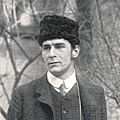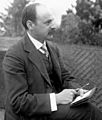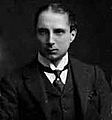1916 facts for kids
| Millennium: | 2nd millennium |
|---|---|
| Centuries: | 19th century – 20th century – 21st century |
| Decades: | 1880s 1890s 1900s – 1910s – 1920s 1930s 1940s |
| Years: | 1913 1914 1915 – 1916 – 1917 1918 1919 |
1916 (also written as MCMXVI) was a leap year starting on Saturday in the Gregorian calendar. This means it had 366 days instead of the usual 365, and it started on a Saturday. Many important events happened around the world in 1916, especially during World War I.
Contents
Important Events
January
- January 1 – The Royal Army Medical Corps successfully performed the first blood transfusion using blood that had been stored and cooled. This was a big step forward in medicine!
- January 1 – The famous Impressionist painter Claude Monet created his painting 'Water Lilies'.
- January 5 – Heavy rain caused big floods around San Diego, California.
- January 8 – Allied forces, which included soldiers from Britain, France, and others, left Gallipoli.
- January 13/14 – A huge storm hit the Zuiderzee in the Netherlands. It caused a lot of damage. This storm helped the Dutch government decide to build the Afsluitdijk, a large dam, and create new land called polders in what is now the IJsselmeer.
- January 17 – The Professional Golfers Association of America (PGA) was created. This organization helps professional golfers.
- January 18 – A meteorite weighing 611 grams hit a house near Baxter, Missouri.
- January 23 to January 24 – In Browning, Montana, the temperature dropped from 6.7 °C to -48.8 °C (44 °F to -56 °F) in just one day. This was the biggest temperature change ever recorded in 24 hours!
- January 28 – Louis Brandeis became the first Jew to be appointed to the Supreme Court of the United States. This was an important moment in history.
- January 29 – World War I: German zeppelins bombed Paris for the very first time.
February
- February 3 – The main Parliament buildings in Ottawa, Canada, were destroyed by fire.
- February 9 – Tristan Tzara started the Dadaism art movement. Dadaism was a new and unusual way of thinking about art.
- February 11 – The Baltimore Symphony Orchestra performed its first concert.
- February 21 – World War I: The long and terrible Battle of Verdun began in France.
March
- March 20 – Albert Einstein published his Theory of Relativity. This theory explains how mass and energy are connected, and it changed how scientists understood the universe.
Famous Births
- April 5 – Gregory Peck, a famous American actor, was born. (d. 2003)
- July 28 - David Brown, an American producer who made movies, was born. (d. 2010)
- October 14 - C. Everett Koop, an American politician and spokesperson, was born. (d. 2013)
- November 23 - Michael Gough, a British actor, was born. (d. 2011)
Notable Deaths
- June 4 - Lord Kitchener, who was the British Secretary of State for War, died.
Images for kids
-
Proclamation of the Irish Republic distributed during the Easter Rising
-
Royal Fusiliers (City of London Regiment) marching to the trenches, November 1916
-
Dame Olivia de Havilland
-
Sir Edward Heath
-
Emperor Franz Joseph I of Austria
-
Blessed Charles de Foucauld
-
King Thibaw Min
-
Saint Albert Chmielowski
See also
 In Spanish: 1916 para niños
In Spanish: 1916 para niños
Black History Month on Kiddle
Famous African-American Inventors:
 | Lonnie Johnson |
 | Granville Woods |
 | Lewis Howard Latimer |
 | James West |

All content from Kiddle encyclopedia articles (including the article images and facts) can be freely used under Attribution-ShareAlike license, unless stated otherwise. Cite this article:
1916 Facts for Kids. Kiddle Encyclopedia.




























































